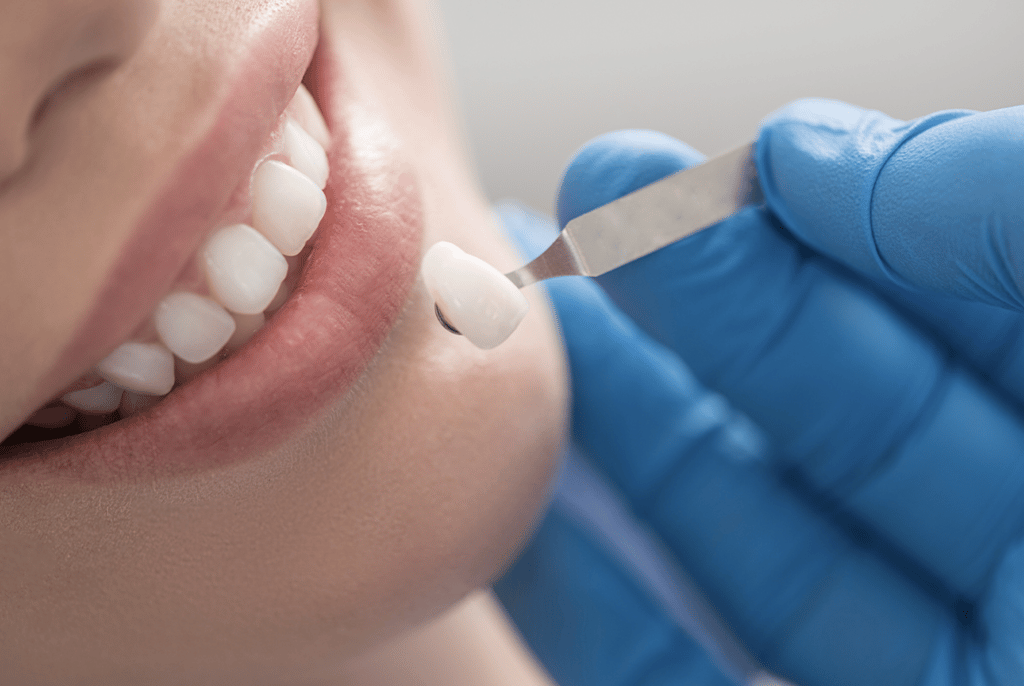A lot of times, people who want to get a dental procedure that involves either crowns or veneers need to learn the difference between both dental restoration. One of the most frequently asked questions at Dentakay Clinic is about the difference between crowns and veneers. Most of our clients are troubled and often have the question, “should I get veneers or crowns” on their minds.
This article will address that and tell you all you should know about dental veneers and crowns. We shall discuss veneers and crowns, their differences and similarities, their advantages and disadvantages, and when to use each dental restoration.
Veneers vs Crowns
A crown covers the entire tooth and is around 2mm thick. It can be created from porcelain, metal alloys, or porcelain that has been fused with metal alloys.
On the other hand, a veneer is glued to the front of the tooth and has a thickness of about 1mm. Porcelain or other materials may be used to create veneers.
Depending on your unique situation and treatment requirements, you may need a veneer rather than a crown. The following ailments most frequently need crown or veneer restorations:
- fractured, cracked, or chipped teeth
- teeth with stains
- Uneven or crooked teeth
- decaying or weak teeth
Except for metal crowns, both veneers and crowns will have exact colour matching to your teeth.
Aside from this, the cost of getting a dental veneer differs from that of a dental crown. On average, the cost of getting a dental veneer ranges between $900 and $2500, while dental crowns, on the other hand, range between $1,000 and $3,500 per tooth.
The cost of getting a dental crown may be covered by insurance, while dental veneers will not because it is considered a cosmetic procedure.
Now let us delve deeper into what exactly veneers and crowns are.
What Are Dental Veneers?
These are coatings that dentists apply to your teeth to improve their appearance or function. Dental veneers are normally constructed from porcelain or a composite material, colour-matched to your teeth, and stain-resistant.
Veneers must be applied in numerous steps. Your dentist first recommends a prosthodontist to you. The dentist listens to your oral worries and then explains how veneers can help you achieve your objectives. They might need to produce a cast of your teeth or take X-rays.
If it is decided that veneers are the best option for you, the prosthodontist will prepare the tooth or teeth in question. Your tooth might need to be shaped so the veneers fit properly, and a temporary coating is applied. The permanent veneer must then be bonded to your teeth as the final stage.
What are Dental Crowns?
Dental crowns differ from veneers in that they are caps that cover your entire tooth. Because a dental crown covers the entire tooth, more of the tooth must be filed down before a crown can be installed. Usually, crowns are used to repair teeth that have suffered severe decay, fissures, or fractures. Your dentist will have to eradicate the decayed part of the tooth and maybe reconstruct portions of the tooth to support the dental crown if tooth decay is the cause of your requirement for a dental crown. Dental crowns are often made of all-metal alloys, porcelain, or porcelain fused to metal alloys (PFM). Your dentist will make the crown fit over your tooth securely, and it will be cemented in place after that.
Veneers vs crowns: what are the similarities?
In the dental veneers vs crowns debate, a lot of people tend to wonder how dental veneers and crowns are similar.
Here the main similarity between them is why people often think veneers and crowns can be used interchangeably.
This major similarity is that both veneers and crowns are used in dental treatments and procedures, and they improve the teeth’ aesthetics, appearance, and function. They both are made to match the colour of the natural teeth – giving users a perfect smile.
Also, note that the mode of care for dental veneers and crowns is quite similar. Like the rest of your teeth, they must be brushed twice daily, and floss must be used to remove food particles. Additionally, professional cleaning and restorative inspection will require routine dental visits.
Should I Get A Veneer or a Crown?
A lot of times, this is the question on people’s minds. There has been a debate on veneers vs crowns. However, even though people are now aware of the differences between veneers and crowns, most dental patients need to know which is right for them and which procedures they should go for.
Most people believe that dental veneers and crowns carry out similar functions and, as such, can be used interchangeably. This is not true, as each patient has a unique condition, which will determine which procedure is most suitable for the patient.
Your dentist may advise choosing one dental treatment method over another based on your circumstances. Since the tooth enamel is more vulnerable and needs more robust protection when a tooth is severely injured, has undergone a root canal, or has a large filling, dental crowns are often the best option. On the other hand, porcelain veneers work best for simply aesthetic reasons. Your dentist will probably suggest porcelain veneers if your tooth is mainly unchanged and requires a modest shape adjustment or an aesthetic improvement.
Conclusion
Be mindful that improving your smile and the functionality of your teeth are the two primary considerations when deciding between veneers and crowns.
Veneers are frequently used for cosmetic modification, such as a chipped tooth. When a tooth has had significant deterioration, crowns should be considered.
Consult your dentist to evaluate your best options while considering your dental health, the intended outcome, and budget.
It’s also crucial to remember how crucial oral hygiene is to your health. Maintaining your veneer or crown, as well as the rest of your teeth, requires routine dental checkups and proper oral hygiene habits.
